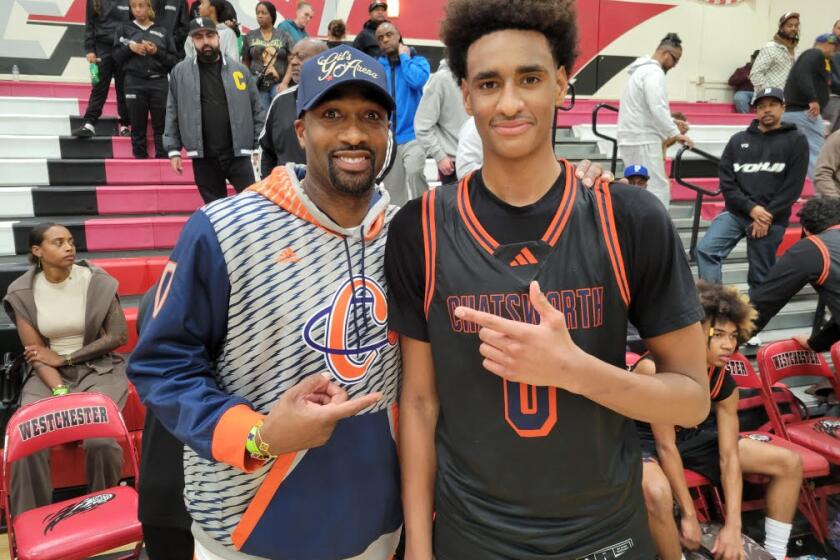It’s No Game : Sports a Lower Priority for Three Girls Once They Take More Demanding Position of Mother
Page Lubbock is baring her reputation along with her soul. She’s speaking passionately, tearfully. She has endured pain, heartache and joy in motherhood.
She is not alone.
Nationally, one in nine females ages 15-19 becomes pregnant; in California, it’s about one in 14.
But she’s here, for the world to see, because her softball coach, Rob Weil, thought she could do a lot of good by telling her story. Maybe she can, if anyone listens.
“I can’t imagine something like this happening to someone and not wanting to keep it from happening to other people,” she says. “I want to help.”
There are other stories, too. Lubbock isn’t the only high school athlete who has gotten pregnant. Hers, it seems, is just the most tragic. She was a sophomore at a Christian school when she got pregnant, and her life could have been ruined by the aftermath.
Jessica Walker was in the fast lane at Huntington Beach High, and her life could have been saved.
Tabby Cleveland was just floating along at Costa Mesa High, unsure of what she really wanted out of life until she became a mother.
There are others. At least two local athletes became mothers this school year. But Lubbock prays nightly it doesn’t happen to anyone else.
Page Lubbock
Now a senior at Pacifica and playing on one of the Southern Section’s best softball teams, Page Lubbock played last year, too, living a charade.
Lubbock, 18, became pregnant while a sophomore at Calvary Chapel. She still wasn’t dating at the time, she was just hanging out with her boyfriend, and she didn’t let anyone know until she was five months along.
She finished the last month of the school year studying at home and remained on restriction by her parents through the summer, until her son was born Sept. 8, 1994, the first day of classes at her new school, Pacifica High.
He was one of 2,880 children born to girls age 15-18 in Orange County that year.
Within a month, Levi McKesson Lubbock developed a skin condition, the first of several problems. A month later, he had swollen lymph nodes. The baby suffered from a condition similar to DiGeorge Syndrome, in which there is no thymus gland to regulate the immune system.
He died after five months in the hospital. Doctors called it “near-DiGeorge” on the death certificate.
Her parents, Jack and Vicki McMahon, didn’t want Lubbock to be a celebrity for having a child, and so she kept the baby a secret from all but about a half-dozen people on Pacifica’s campus.
Every day she dashed from school or practice to the baby, first at home, later to Children’s Hospital of Orange County.
“After I lost the baby, I got a second chance to be a kid again,” Lubbock said. “I hope to take advantage of it by learning from it and helping other people. And even though I’m not burdened with [the baby] anymore, not one day goes by that I don’t wish that I still was.
“I should be an example. I don’t want this to happen to any of my other friends, whether it’s having a baby, or if the baby dies, or getting a scare that you’re pregnant. I hope I’m an example, even if what happens to me scares them. That’s one of the positive things that came out of this.”
The baby lived 7 1/2 months and suffered nightly the final five, and Lubbock suffered alongside him in the oncology ward until 10 p.m. every night. She slept over at CHOC on the weekends.
During Levi’s life, Lubbock took one Friday to watch a movie at a theater near the hospital. All the other nights, she watched over her baby.
Weil, Pacifica’s softball coach, didn’t know about this until the final month of the season, when Lubbock began missing practices daily. He bought black armbands for the team when Levi died, three weeks before the playoffs began.
Softball parents provided food for more than 100 after the funeral, and when Lubbock showed up after missing four weeks of practice and two weeks of school, it was quite therapeutic.
“I’ll always remember the first day I came back to practice,” Lubbock said. “We all sat down and Rob [Weil] said, ‘Finally, we have our whole team back.’ It meant that I was more important to him and the team than I thought.”
Weil said a team to fall back on was important to Lubbock, and she agreed. So did her mom.
“It would have been very easy for us to say, ‘You just drop out of softball,’ ” McMahon said. “My husband, Jack, comes from a sports family. He said she needed to be there for the camaraderie, for the distraction, for the physical activity. You’re part of a team and you’re like everybody else for the hour that you’re there. Maybe adults can’t do that, but kids can. You’re expected to do that. You’re given permission to not think about it and not be in the middle of all that pain.”
Lubbock hopes to use sign language in her career, either as an interpreter or teacher. Her hopes of an athletic scholarship are long gone.
“Whether I had the talent or not, I had the aspirations,” she said. “And now, I’m just kind of on the team, in the background. I’ll go to a junior college. I’m hoping to play basketball, and I’m still thinking about softball. . . . I didn’t give that extra dedication I could have if I didn’t have a baby. Basically, my career ended midway through my sophomore season.”
She lost faith in a lot of things, including love, and wonders how long it will be before she can be as close to someone as a to her child’s father, who left the relationship shortly after the birth.
But there are occasional moments when that faith is restored, when someone fully understands and reaches out.
Two Sundays ago, Lubbock received a message on her pager. It was from her teammate, Toni Mascarenas. It read, “Happy Mother’s Day.”
“It meant more to me,” Lubbock says, “than Toni will ever know.”
Jessica Walker
Lubbock was a naive 15-year-old who had never dated before she got pregnant. Jessica Walker wasn’t.
She was 16 and “doing the wrong things: drugs, partying a lot. . . . I was good in school, good in softball, I was going to get a scholarship to college. Basically, everything that every parent wants. But I was having a lot of fun on the side.”
Walker was a second-team all-league softball player in the Sunset League her sophomore year, but she struggled with burnout from the commitment to a traveling team. She needed a break, but couldn’t because she didn’t want to disappoint a father she felt put her on a pedestal.
The break from softball came when she became pregnant in late 1994, early in her junior year.
Before she had her daughter, Justice Lee Anne Walker, on June 15, 1995, Jessica says she did what she wanted to do. “Most of the time, I worked my way out of the problem, and then did it again,” she said. But she couldn’t work her way out of this.
Walker and the baby’s father had dated two years in an off-and-on relationship. It was at the end of her second trimester that it was off for good.
“I don’t think he was ready to be a father and it was a lot of pressure for him,” Walker said. “I told him he had to get his life together. I have to be a 24-hours-a-day, seven-days-a-week mother and I can’t go out whenever I want, and I’ve told him he has to be a 24/7 father.”
There is irony in Walker’s words. She wasn’t sure she could handle college, a job, a career. Much less a baby.
“I was scared,” she said. “I’ve never been the type of person to work at things. They’ve always usually been handed to me. I just thought something would happen where I would have a lot of money, either getting it from my parents or marrying someone who had a lot of money.”
Her relationship with her parents was strained. The generation gap was wide enough to cause an echo when they spoke.
After four home pregnancy tests in October 1994, she was still shocked when a doctor confirmed her fears. It was the first time she had no answers.
Both parents, Lowell and Rita Walker, were devastated when they found out. Walker, whose relationship with her father at the time revolved around softball, ran away literally and figuratively--from the family home, from her parents, from Mary’s Shelter in Santa Ana (an unwed teen pregnancy home where girls learn about delivery and child care).
“My life was planned out since seventh grade,” Walker said. “I was going to go to college on a softball scholarship and basically have a good career, get married and have a family, just like what everybody wants.
“Facing my dad was like breaking his heart,” she continued. “When I finally did talk to him [after two months], he told me to come home and that we could do what we could do.
“It’s not the kind of problem you can run away from.”
There were still squabbles, but she was home for good on Christmas, and the holidays eased the tension. They went six months before father and daughter got close again.
“[Lowell] was so devastated and so hurt,” Rita said. “I think he felt his dreams for her had gone up in smoke, which is what a lot of parents think when you first find out your daughter is pregnant.”
Walker, 18, has done a lot of maturing since Justice was born. “I can see why my parents imposed the rules they did to try to protect me from myself.”
She didn’t play softball her junior year, getting the break she desired, but it tugged at her incessantly. After Justice’s birth, Walker’s parents gave her the option of playing softball or getting a job. A sharp-fielding third baseman and No. 2 pitcher, she batted .350 this season.
The recruiting letters that arrived her sophomore year are filed away. Junior college is probably her next step.
Her schedule is a scramble between school, home, practice, and night school. If she’s a better person for it, she doesn’t encourage motherhood as a means to an end.
“I wish it didn’t take me having a baby to have to mature,” Walker said. “I wish I could have done it on my own. Besides the fact that her father isn’t there and all the negative things you hear about having a baby so young, everything turned out for the better.
“I don’t do drugs anymore. I don’t have to party all the time. I learned how to respect myself, my family and my friends, and there’s more to life than just having a good time. I can honestly say that if it wasn’t for her, I don’t know where I would be, whether it was on the streets or doing drugs or dropping out of school. Any of those things could have happened.”
Tabby Cleveland
Tabby Cleveland Davis got a dinette set for Mother’s Day. She and her husband, Dean, have nice furniture, two cars that run, a child in the playpen and one on the way.
Davis, 19, didn’t know what she wanted to do with her life two years ago except play softball. She had the county’s fourth-highest batting average and second-most stolen bases playing for Costa Mesa her junior year.
She was also working at a movie theater. She had known Dean Davis, the assistant manager, five months before he asked her out. Three months later, he proposed. About three months after that, she was pregnant.
A 1990 study indicated 84% of fathers of children born to adolescent mothers live apart from their children. Davis, 26, is among the 16%.
Ryan Daniel Davis was born March 18, 1995. His parents married on Oct. 28.
“We both missed out on chances,” Dean said. “But I wouldn’t trade it for anything.”
Neither would Tabby, whose dialogue is punctuated by declarations of happiness.
“Way too many teens are getting pregnant,” she said, “but I’m not saying every single one of them is going to be horrible.”
Davis graduated from Horizon High School, a continuation school that has a program for teen mothers. Her school changed, her friends changed, “Everything changes,” she said. But she regrets little. “My son is a blessing. So many people can’t get pregnant.”
Davis didn’t play softball again. She considered a recreation league, but decided with Dean to have another child, due in July.
“If I had kept playing softball and went to college,” she said, “I don’t think I would be any happier.”
She, Dean and Ryan live in a two-bedroom apartment. To listen to Tabby, it’s the lap of luxury.
“People look at this in such a bad way,” she said. “I’m not saying this is a way of life for everybody, but it happens to be for me and my husband.
“The reason I keep saying I’m so happy is I feel I do have to convince people. I’m not just another number for the teenage pregnancy rate.”
More to Read
Get our high school sports newsletter
Prep Rally is devoted to the SoCal high school sports experience, bringing you scores, stories and a behind-the-scenes look at what makes prep sports so popular.
You may occasionally receive promotional content from the Los Angeles Times.






